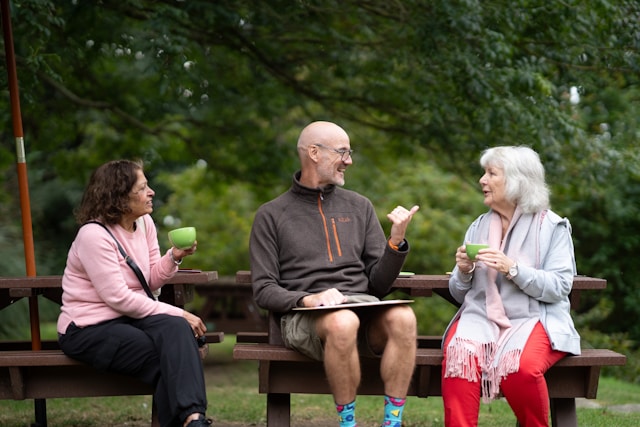
5 Steps to Wellbeing and Improved Mental Health
Mental health is fundamental to overall wellbeing and quality of life for all adults, especially those seeking residential mental health support services. Research consistently shows that good mental health improves life outcomes, enabling individuals to thrive in their daily lives. Understanding and prioritising mental wellbeing is the first step towards a healthier mindset.
Understanding Mental Wellbeing in Adult Residential Care
Mental wellbeing is more than just the absence of mental illness — it’s about feeling good and functioning well every day. For adults living in residential mental health care, this can mean having the strength and confidence to face life’s ups and downs, developing a sense of purpose, and feeling connected to others. Think of mental wellbeing as the foundation for leading a fulfilling life. It’s the ability to manage stress, solve problems, build positive relationships, and bounce back from setbacks. In a residential care setting, this journey is supported by a team of caring professionals, peers, and family who help create a safe and encouraging environment.
Research shows that when people have good mental wellbeing, they are more likely to feel hopeful and motivated, which in turn improves their physical health. It’s a vital part of recovery and everyday happiness. The NHS emphasises that mental wellbeing should be a priority for everyone, not just those facing mental health challenges.
Living in a residential care environment can sometimes feel overwhelming, especially if it’s a new experience. But it’s also a place where individuals can rediscover their strengths and interests with the right support. The sense of community and routine can play a huge role in building mental resilience. Simple things like meaningful conversations, engaging in hobbies, and feeling heard can make a big difference. Understanding this helps families support their loved ones more effectively. Encouraging open communication, celebrating small achievements, and recognising each person's unique journey are key.
The Link Between Mental Health and Wellbeing
Mental health and mental wellbeing are closely connected but not exactly the same thing. Mental health refers to how well a person manages their emotions and copes with difficulties, while mental wellbeing is about feeling good and functioning well in everyday life. Both influence each other, and looking after one often supports the other. One of the most important things to understand is the strong connection between mental health and physical health. For example, Regular physical activity doesn’t just keep the body healthy — it also triggers chemical changes in the brain, causing chemical alterations that lift mood and reduce feelings of anxiety or depression. This natural boost can help adults in residential mental health care feel more energised and positive.
Eating a balanced diet plays a similar role. Nutrients from food can affect brain function and mood, which means that what we eat can have a real impact on how we feel emotionally. Encouraging nutritious meals and snacks contributes to both mental and physical wellbeing.
The NHS and many mental health charities stress the importance of approaching health holistically — mind and body together. This means promoting activities and routines that support both mental wellness and physical health in tandem. For adults in care homes, this might include adapted exercise programmes, healthy meal choices, and opportunities for relaxation and mindfulness. Importantly, everyone’s journey is different. Some days will be easier than others, and that’s perfectly normal. The goal is to build resilience over time by finding ways to nurture both mental health and wellbeing, gently adding small positive habits that make a difference day by day.
The five simple steps to wellbeing are practical tools proven to support mental health and foster a more positive mindset. They are designed to be accessible and achievable even for those facing complex challenges, providing a roadmap to improve quality of life and emotional strength.

Step 1: Connect with Others
Connection is essential for emotional support and belonging. In a residential mental health setting, social interactions with peers, care staff, family, and community groups play a key role in building positive relationships. Participating in group activities or volunteering within the care home or local community provides meaningful engagement and reduces feelings of isolation.
Step 2: Stay Physically Active
Regular exercise benefits mental health by improving mood and reducing stress. Care homes often offer tailored physical activities suitable for all abilities, from gentle walks to adapted fitness classes. Encouraging residents to find enjoyable activities and try new things helps maintain motivation and supports sustained wellbeing.
Step 3: Learn New Skills
Acquiring new skills boosts confidence and self-esteem. Residents can engage with workshops, creative arts, or digital learning courses accredited by UK providers like the Open University or local adult education centres. Lifelong learning has been linked to improved mental health, helping individuals stay motivated and engaged.
Step 4: Give to Others
Acts of kindness, such as volunteering or small supportive gestures, foster a sense of purpose and improve wellbeing. Many care homes facilitate community involvement, encouraging residents to contribute through social enterprises or local charity projects. Even simple things like expressing gratitude or sharing kindness are ways of creating positive feelings.
Step 5: Practice Mindfulness
Mindfulness helps individuals focus on the present moment, reducing anxiety about the past or future. Mindfulness techniques, including guided meditation or breathing exercises, are widely used in mental health care across the UK and can be easily introduced in residential settings. Consistent practice supports emotional regulation and resilience.
Putting the Five Steps into Practice
Putting the five steps to wellbeing into everyday life can feel challenging at first, but a supportive residential care home environment can make it much easier. Many care homes offer a wide range of activities and support designed to help residents implement these steps in ways that suit their individual needs and preferences.
For example, to encourage social interaction, care homes often provide regular group activities, such as arts and crafts sessions, music therapy, and social clubs. These gentle group settings help residents build friendships and feel part of a community, which is vital for mental wellbeing. Social workers and families can also support connections by facilitating visits and encouraging communication with loved ones.
Care homes also build and tailor exercise programmes to meet different levels of ability and interests. This might include daily walking groups, seated exercises, yoga classes, or even gardening projects. These activities help residents stay physically active in a safe and enjoyable way, improving both mood and overall health.
When it comes to learning new skills, many care homes offer opportunities to explore new hobbies or develop practical skills through workshops or digital learning. Residents might try creative writing, cooking, IT skills, or even attending local adult education classes with support from care staff. This not boosts self-confidence and helps residents set goals that keep the mind engaged and motivated.
Giving back is also encouraged through volunteering opportunities within the home or community. Residents might take part in peer-support roles, help organise events, or be involved in charity initiatives coordinated by the care home. These roles foster a sense of purpose and connection to the wider community.
Finally, to promote mindfulness and being present, care homes may offer guided meditation sessions, relaxation techniques, or spaces designed for calm reflection such as sensory rooms or quiet gardens. Care staff can gently support residents in trying these techniques, helping reduce anxiety and improve emotional balance over time.
Setting personal wellbeing goals is an important part of putting the five steps into practice. Care teams work with residents to create achievable plans, track progress, and celebrate successes. This personalised approach ensures each person’s emotional wellbeing journey is respected and supported.
Families and social workers can play a vital role by encouraging participation, offering reassurance, and staying involved in the resident’s goals and progress. Together with professional support, this creates a positive environment where mental wellbeing can flourish.
Bringing the five steps to wellbeing into daily life becomes much more achievable within a residential mental health care home, thanks to the tailored activities and supportive environment on offer. Care homes understand that each resident has their own journey and offer a range of personalised options to help incorporate these steps in ways that suit individual needs.


Next Steps at Alderbrook Care Home
Improving mental wellbeing is a personal journey that takes time, patience, and support. At Alderbrook Care Home in Leeds, we understand the unique challenges adults face in residential mental health care and are dedicated to helping every resident build a healthier mindset through the five steps to wellbeing. Our compassionate team works closely with residents and their families to create tailored care plans that encourage connection, activity, learning, giving, and mindfulness.
To learn more about how Alderbrook Care Home can support your loved one’s mental wellbeing journey, please contact us today. Our friendly team is here to answer your questions, arrange a visit, and discuss personalised care options tailored to your needs. Together, we can take the next step towards a healthier, happier life.
References:
- undefined
- undefined
- undefined
- undefined
